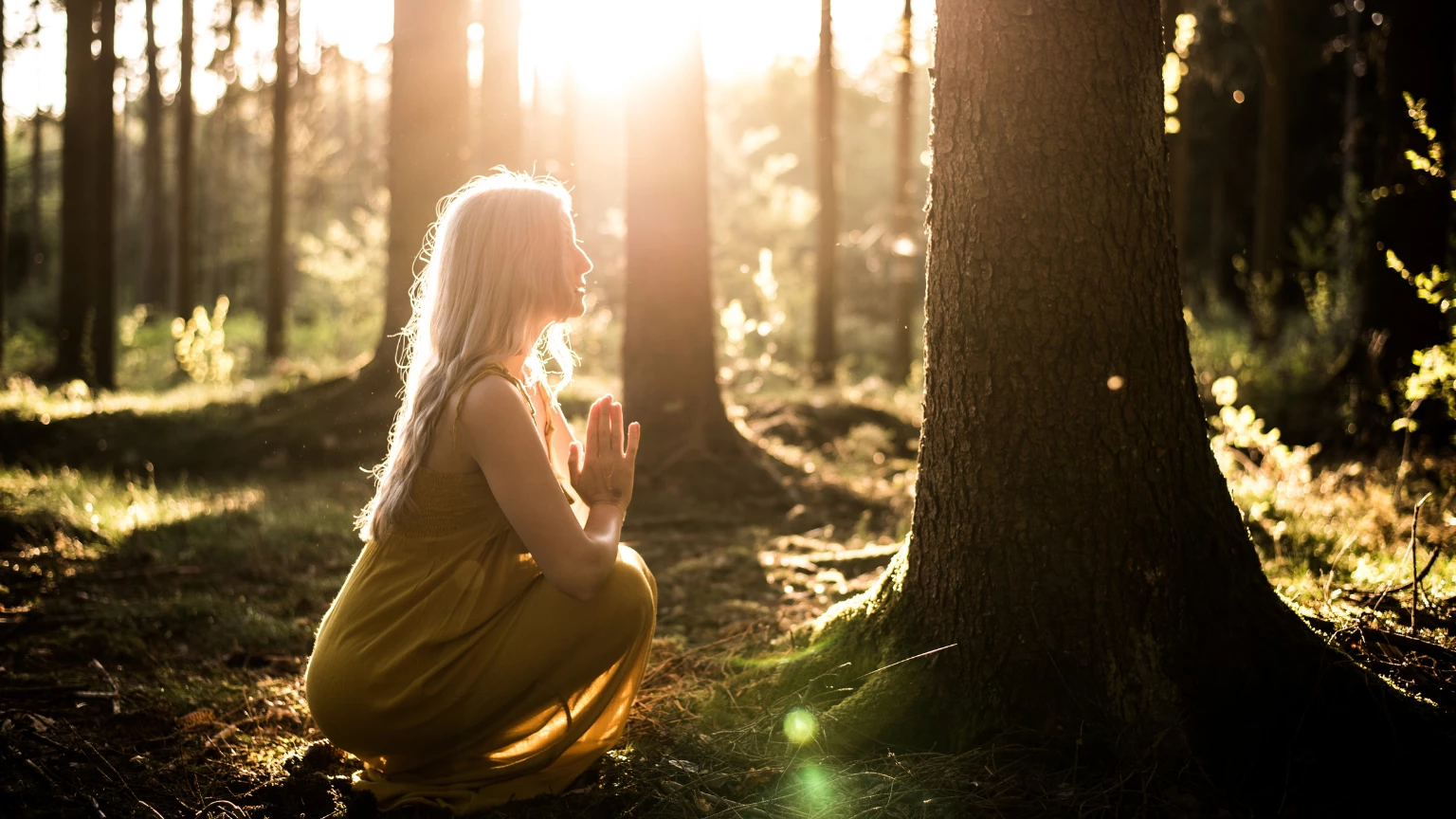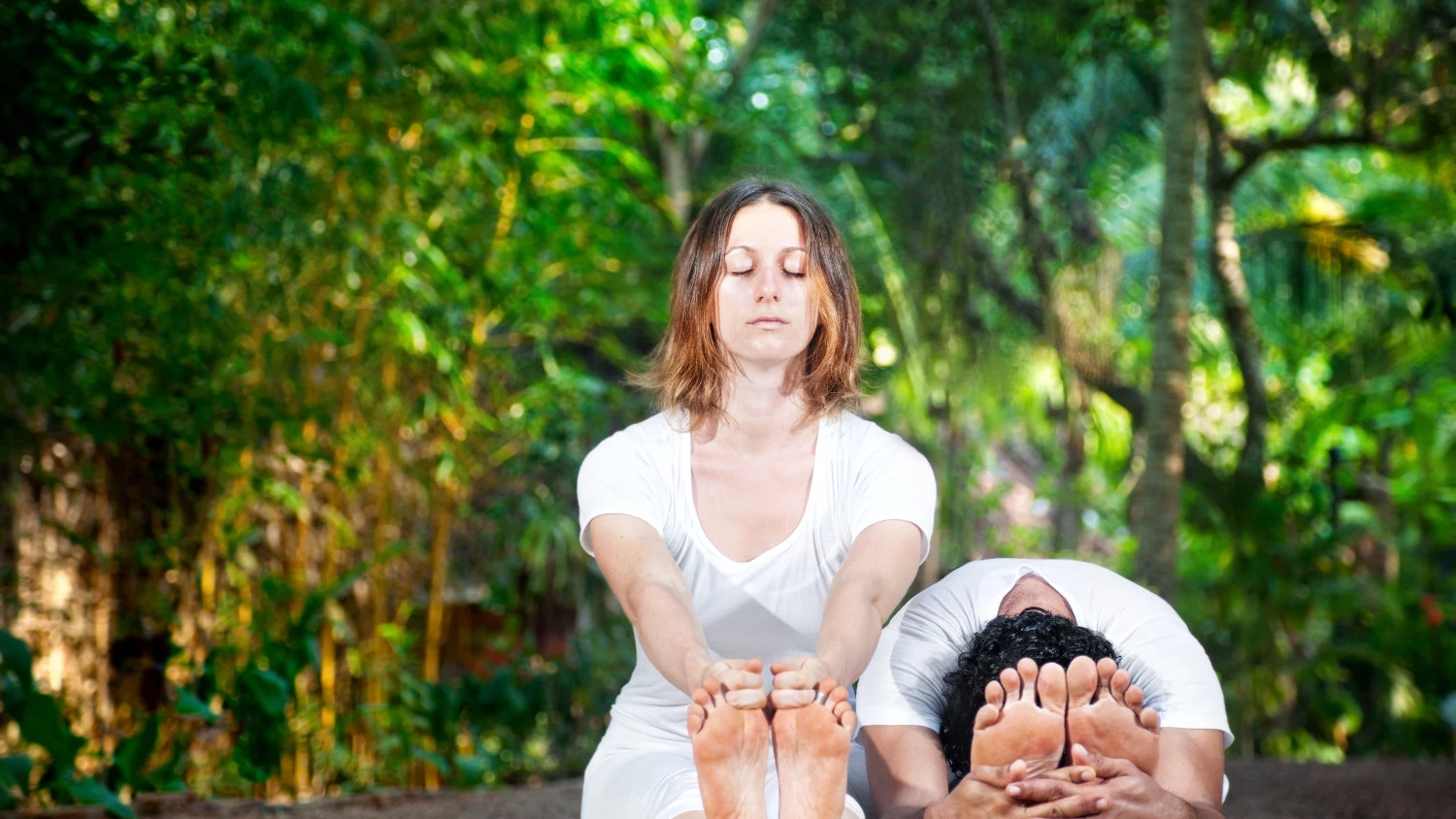The Yoga of Trees: The Art of Shinrin-Yoku (Forest Bathing) and How It Can Benefit You

Trees are our partners on the planet. We breathe in what they breathe out, and they breathe in what we breathe out. Spending time in the woods in the shade of towering trees; walking on the soft, humus-rich earth; and slowing down to enjoy the feel of fresh air on our skin—all these things replenish our energies. Forest bathing, a practice that originated in Japan, is gaining traction here in the West as a way to decompress from the stresses of modern urban living.
What is Forest Bathing?
Forest bathing, or shinrin-yoku, has been a popular topic among scientific communities in recent years, but the practice has existed in Japan since the 1980s. The practice was developed as a therapeutic technique of immersing oneself in nature. Forest bathing can be practiced in any position—sitting, standing, walking, or lying down—and it should involve a deep focus on the sensory experience of nature. Traditionally, forest bathing was facilitated by a guide who would cue participants to meditate on various natural elements of sight, sound, smell, touch, and sometimes taste.
The Theory Behind Forest Bathing
The original theory behind forest bathing was that it could serve as an antidote to the health effects of modern urban life, including air pollution, noise pollution, increased use of technology, and high levels of stress. Researchers in Japan theorized that exposure to nature could have a restorative effect that might lead to physiological relaxation and immune system recovery.
Aside from the theorized physical health benefits of forest bathing, the practice of immersing oneself in nature has been theorized to be healing at the level of the psyche and the spirit, according to Hansen, Jones, and Tocchini, the authors of a systematic review of forest bathing and nature therapy (2017). Forest bathing is thought to aid in alleviating loneliness, depression, and detachment from nature that have been recognized as increasingly common elements of lifestyles in modern urban settings.
Evidence to Support the Health Benefits of Forest Bathing

In recent years, there has been a wealth of empirical evidence to suggest and support the mind-body health benefits of forest bathing. Hansen, Jones, and Tocchini’s systematic review of 64 studies were among the first published scientific reviews to provide conclusive evidence of forest bathing as a means of reducing the contemporary “stress-state” and “technostress” (3).
Specifically, this paper suggests that forest bathing may offer an enjoyable, affordable form of therapy that shows promising evidence in improving immune, cardiovascular, and respiratory system functions; decreasing symptoms of mood disorders, stress, and ADHD; and improving attitudes of gratitude and selflessness (3).
Additional scientific reviews of forest bathing have provided more specific evidence of its psychological and physical effects. For example, a review of 17 field experiments provides strong evidence of forest bathing’s reduction in a parasympathetic indicator of heart rate variability that is associated with parasympathetic nervous system activation and anxiety reduction (2).
Moreover, a systematic review and meta-analysis of 22 randomized control trials, cohort studies, and comparative studies involving 732 participants showed that forest bathing significantly reduced participants’ blood pressure (4). Finally, authors of a systematic review of six randomized control trials found that hypertension, cardiac pulmonary function, immune function, inflammation, oxidative stress, stress, stress hormones, anxiety, depression, and emotional responses were found to be positively impacted by forest bathing (5).
Gaps in the Research on Forest Bathing
Although empirical evidence supports the mental and physical health effects of forest bathing, there is uncertainty surrounding duration, frequency, and format of forest bathing required to elicit the health benefits. Authors of another systematic review of 36 studies on forest bathing suggest that there is too much variation among the practices defined as “forest bathing” in research to allow researchers to suggest clinical practice guidelines (1). Further research is required for a meaningful understanding of minimum levels of forest bathing for human health.
Implications for Yoga
Although more research is needed to elucidate clear guidelines for forest bathing, it seems that making an effort to immerse ourselves in nature can offer potential mind-body health benefits. Forest bathing is a  mind-body activity that can be practiced in addition to and in conjunction with yoga. The benefits of forest bathing may be extended to other natural habitats, such as prairies, mountains, and beaches.
mind-body activity that can be practiced in addition to and in conjunction with yoga. The benefits of forest bathing may be extended to other natural habitats, such as prairies, mountains, and beaches.
Thus, the evidence supporting forest bathing may incentivize us to practice yoga in outdoor settings and to lead or attend retreats in whichever natural landscapes may be accessible. If we can’t make it to the woods, it would seem that making small efforts to include elements of nature in our studios and practice spaces may be healing. This may be a simple as including indoor plants, inviting in natural lighting, letting in the fresh air, or playing nature sounds during our yoga classes and practices. Alongside and in addition to yoga, forest bathing can be a sensory experience that can allow us to nourish the health of our minds and bodies.
Read more on the benefits of being in nature from YogaUOnline and special contributor, Charlotte Bell-The Yoga of Walking.
Also, read...
Love your Back With This Spine-Focused Yin Yoga Sequence
Jan 26 – Leah Sugerman, E-RYT 500, YACEP
Upward Plank Pose: Wrist-Saving Variations
Jan 23 – Bridget Frederick, eRYT 500
A Relaxing Yin Yoga Sequence at the Wall
Jan 19 – Leah Sugerman, E-RYT 500, YACEP
Related courses
Yoga for Back Care and Spinal Mobility: A 4-Week Practice Series
With Baxter Bell
The Psoas Connection: Core Stability for Movement, Breath & Digestion
With Leslie Howard
Optimizing Your Breath: Yogic Breath for Cellular Vitality
With Doug Keller

Lacey Ramirez writes for YogaUOnline and is an RYT-500 & ERYT-200 yoga teacher, global health researcher, and writer based in St. Louis. Through her work, she seeks to make yoga accessible, inclusive, and equitable.
Lacey discovered yoga as a tool for centering during her years as a competitive runner. Since then, yoga has served as a way to connect with her body throughout her experience of pregnancy and parenthood. She teaches because she hopes others can use this sacred practice for calming, healing, and transformation.
As a yoga teacher, Lacey specializes in teaching restorative, Yin, prenatal, and trauma-informed Vinyasa yoga. She has also completed birth doula and prenatal/postnatal barre certifications and trainings. Additionally, she holds a Masters of Science in Global Health and Population from Harvard T.H. Chan School of Public Health. To learn more and connect, visit her website laceyramirez.com
References
- Corazon et al. (2019). Psycho-Physiological Stress Recovery in Outdoor Nature-Based Interventions: A Systematic Review of the Past Eight Years of Research. International Journal of Environmental Research and Public Health, 16(10), E1711.
- Farrow, P.T., & Washburn, K. (2019). A review of field experiments on the effect of forest bathing on anxiety and heart rate variability. Global Advances in Health Medicine,
- Hansen, M.M., Jones, R., & Tocchini, K. (2019). Shinrin-yoku (forest bathing) and nature therapy: A state-of-the-art review. International Journal of Environmental Research and Public Health, 14(8), 851.
- Ideno et al. (2017). Blood pressure-lowering effect of Shinrin-yoku (forest bathing): A systematic review and meta-analysis. BMC Complementary Alternative Medicine, 17(1), 409.
- Oh et al. (2017). Health and well-being benefits of spending time in forests: a systematic review. Environmental Health and Preventative Medicine, 22(1):71.
Recent articles
Sankalpa, Visualization, and Yoga: The Diaphragm-Psoas Connection
Feb 16 – By: Ray Long, MD, FRCSC
Donna Farhi: Keys to Pain-free Living – The Importance of a Balanced Core Cylinder
Feb 12 – Eva Norlyk Smith, Ph.D.
The Fourth Niyama: Svadhyaya – Self-Study
Feb 09 – By: Christine Malossi
Categories
Upcoming courses
Yoga for Back Care and Spinal Mobility: A 4-Week Practice Series
With Baxter Bell
The Psoas Connection: Core Stability for Movement, Breath & Digestion
With Leslie Howard
Recent articles
Almost there...
Sorry, we couldn't find anything...
Anatomy
Sankalpa, Visualization, and Yoga: The Diaphragm-Psoas Connection
In yoga practice, the Sanskrit word sankalpa means “resolution” or “intention,” usually in association…
Feb 16 – By: Ray Long, MD, FRCSC
Yoga Teaching
Donna Farhi: Keys to Pain-free Living – The Importance of a Balanced Core Cylinder
Donna Farhi is an internationally renowned yoga instructor, leading countless intensives and teacher training…
Feb 12 – Eva Norlyk Smith, Ph.D.
Beginning Yoga
The Fourth Niyama: Svadhyaya – Self-Study
The fourth of the niyamas (personal observances) from Patanjali’s Yoga Sutras is svadhyaya. In…
Feb 09 – By: Christine Malossi




